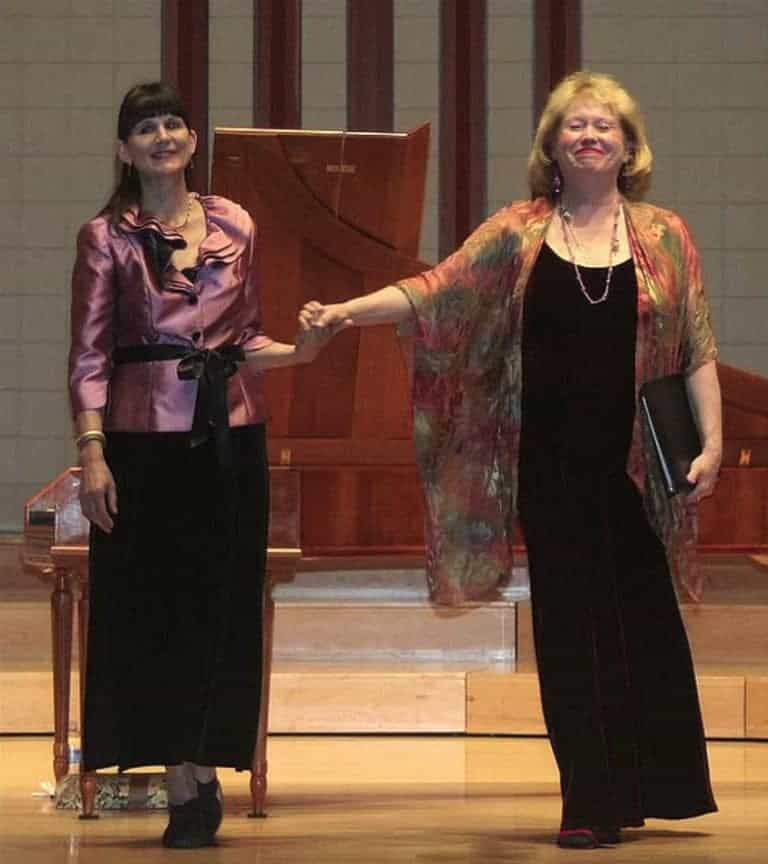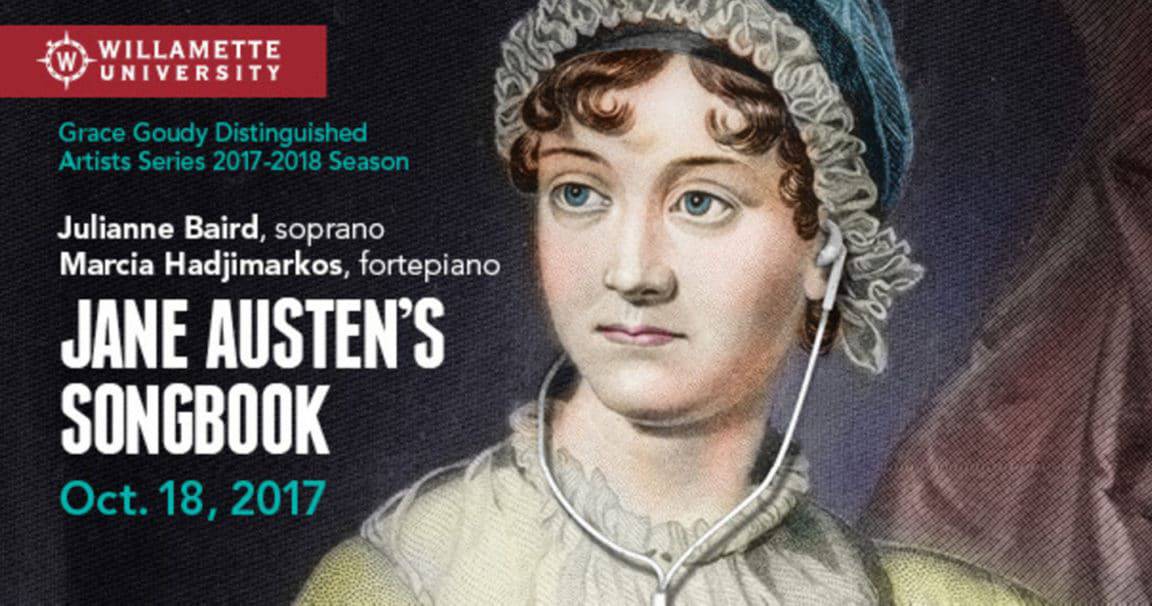Combine the rarefied world of the English Regency with a celebrated contemporary soprano and a talented fortepianist and you get “Jane Austen’s Songbook,” presented on October 18 in Hudson Concert Hall at Willamette University. The great diva/Baroque musicologist Julianne Baird partnered with Portland native Marcia Hadjimarkos. In between musical numbers, students Eliza Buchanan and Max Sherman read music-related passages from Pride and Prejudice, Emma, Sense and Sensibility, and Persuasion. Jane Austen, a pianist herself, had hand-copied many of her favorites into her own songbook.
Although the program included selections from composers well known to us, like Handel, Haydn, and Gluck, most of the pieces were known mainly to Jane Austen and her friends — songs about country life and love, drinking songs, and laments about war. The narrators provided a literary backdrop to each set of pieces, exposing the affectations of the day and Austen’s wit.

While these selections provided good examples of the period’s taste, they were not a particularly good showcase for Ms. Baird’s glorious Baroque voice. She has issued over 130 solo CDs and is famous for her interpretations of Bach, Handel, and other Baroque composers as well as some modern Americans. She’s also a renowned musicologist with a Ph.D. in music history from Stanford. Perhaps that explains her enthusiasm for these little known 18th Century works.
Unfortunately, the pieces in this program, while amusing, turned out to be pretty bland fare. The first, “Chastity,” from Handel’s Susanna, is a sweet though relatively tame song, and not the best vehicle for Ms. Baird’s flexible and inspiring voice. In later numbers by William Reve and Samuel Webbe, she was better able to show off her runs, trills, and other embellishments, especially in the higher registers.
There was no need for lyrics printed in the program notes since Baird’s diction was flawless. But throughout her performance I missed the glorious Baroque voice I had heard in recordings. While her high notes rang out clearly, she seemed to lack energy in the mid-range and below.
The performance was not helped by the room acoustics. One of the adjustable fabric shades was broken, so all the shades had to be in the closed position, maximizing the room’s absorption and producing a muffled sound. This kind of intimate performance would have been much better suited to a smaller venue rather than such a large, impersonal, and sparsely populated hall — there were only about 50-60 attendees in a hall that seats 440.
Playing on a honey-colored fortepiano, Marcia Hadijmarkos provided artful and sensitive accompaniment throughout. In addition, she played a pair of solos: a charming Haydn Sonata in C major, Hob XVI:35 and quite a vigorous (to the extent possible on the dainty fortepiano) rendition of the “Battle of Prague” by Frantisek Kotzwara. During the latter number, Ms. Baird barked out commentary in the form of single words and phrases, like trumpet, cannons, horses galloping, cries of the wounded, and victory! The audience was a bit mystified at first, but at the end of the piece, everyone laughed and applauded.
The final number was “The Soldier Tir’d” by Thomas Arne, a favorite of divas like Beverly Sills and Joan Sutherland. In it, Ms. Baird let loose her virtuosic coloratura and dazzled us all until she was interrupted by a plant in the audience playing the part of Pride and Prejudice’s Mr. Bennett, saying, “You have delighted us long enough.” And that was the end!
I left feeling amused but not exactly satisfied. Back home, I put on my Julianne Baird CDs so I could wallow in the sublime Baroque sound that I had hoped for. And I felt a pang of regret that I had given away all my Jane Austen books the last time I’d moved. Maybe I’ll check the library for Sense and Sensibility.




